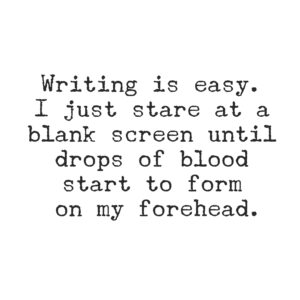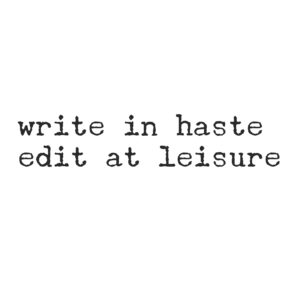Got a call this week from a dear old friend from our Minnesota days. Wasn’t it just the other day our kids were small and we were taking turns hosting sleepovers?
It seems their offspring, like ours, had the chutzpah to grow up and plan productive lives of their own. (Kids can be so insensitive.) He was calling because one of his young-adult girls had recently expressed interest in becoming a writer. He was hoping I could share a few insights or practical words of wisdom to help her get started.
I actually get this question or some variation thereof quite a bit. A few times per month someone reaches out to me by phone, email or social media in search of advice. Some, like my friend’s daughter, want to pursue writing as a calling. Others believe they have a book in them that needs to get out. Some have experienced an extraordinary life event and have repeatedly been told by friends and loved ones, “You need to write a book about that.”
Of course, I’m always happy to dip a ladle into the exotic bouillabaisse that is my life experience and dole out a steaming, savory cup of crackpot sagacity for a hungry enquirer. However, I’m sure most of these askers are profoundly disappointed once they hear my advice. I can see it on their faces. That’s it? That’s all you’ve got?
I suspect my honest answer is far too simple to be satisfying.
How simple? The essence of the advice I give aspiring writers can be found in the two-word reminder I once put on a Post-It Note and stuck on the front of the monochrome monitor of my IBM PC XT compatible (a whopping 640k RAM) 30 years ago when I hadn’t written anything longer than a 60-second radio commercial or a two-minute newscast.
The handwritten note said, “Writers write!”
 I’m not the first to have used that reminder as a motivational pointy stick for self-prodding. It’s a novelists’ proverb that has been passed around among aspiring writers since Jane Austen was in a training bra.
I’m not the first to have used that reminder as a motivational pointy stick for self-prodding. It’s a novelists’ proverb that has been passed around among aspiring writers since Jane Austen was in a training bra.
The meaning is that countless people think about writing. Multitudes speak frequently about their plans to write. But precious few ever sacrifice the time, push through the pain, and actually put words on paper (or screen).
Pain? Oh, yeah. I’ll get to that in a moment.
But just know that the first rule of Write Club is: “Don’t talk about Write Club. Just write.” You may be bad at it at first. (I was. Reading my early stuff now induces a grand mal cringing-wincing episode in me.) But you’ll get better. No one may pay you for what you write at first. But you’ll be banking experience and learning the craft.
Back in the Late Cretaceous Period when I first started writing, there were no blogs and no self-publishing opportunities on Amazon. There have never been more venues in which to write; and it’s never been easier to have your writing “discovered” by others than there are today. But the writing has to get done. Which brings me to this . . .
Writing is sometimes often almost always painful.
New Acquaintance: “Do you enjoy writing?”
Me: “Oh goodness, no.”
New Acquaintance: (shocked-confused face) “Really?”
Me: “No. I don’t like writing. But love having written. Do women enjoy childbirth?”
 Which brings me to another of my favorite proverbs for writers: “Writing is easy. All you have to do is stare intently at a blank screen until drops of blood form on your forehead.”
Which brings me to another of my favorite proverbs for writers: “Writing is easy. All you have to do is stare intently at a blank screen until drops of blood form on your forehead.”
In other words, if you wait to be infused with inspiration to start writing, you’ll likely never start. You just start slogging. Slog long and persistently enough and inspiration has a way of sneaking up on you.
So here it is. The secret sauce. The mysterious alchemic formula I’ve used to write 37 published books (most of them anonymously, as a ghostwriter), two of which became New York Times non-fiction bestsellers.
- Put rear in seat in front of keyboard.
- Lay one word down after another until you have a whole sentence.
- Keep creating sentences until you have a paragraph.
- Keep building paragraphs until you have a full page.
- Repeat.
I’m sorry. I truly wish it were sexier than that. It’s just not. Thus, the truths described above winnow out about 98% of all aspiring writers. They are also the reason I’ve been able to make a pretty good living writing other people’s books for them over the last 30 years.
Of course, if a person is willing to put in the time and hard work—has the “fire in the belly”—there are some practical things one can do to get better, faster. There are a few hacks, tips and tricks in the craft.
 One thing I’ve noticed over the years . . . Really good writers tend to be readers. In fact, I’ve never met a gifted, successful author who wasn’t a voracious devourer of books.
One thing I’ve noticed over the years . . . Really good writers tend to be readers. In fact, I’ve never met a gifted, successful author who wasn’t a voracious devourer of books.
More specifically, it’s helpful to read good writing. Read over your head. Read above your pay grade. Read outside your usual interests and preferred genres. Read genius writing that’s so good it’s actually discouraging. (The discouragement will wear off, but the genius will rub off, and germinate in your soul.)
Here’s another pro-tip I wish I’d learned sooner . . .
Yes, “writers write.” But then they re-write. And then re-re-write. You never do your best writing on your first pass. The best, most productive writers create a rough draft—the operative word there being “rough.” They don’t try to perfect a sentence before moving on to the next one. Likewise, they don’t try to perfect a paragraph before moving on to the next.
They write quick and dirty, loose and ugly, just to get the basic ideas, concepts and thoughts down before they evaporate. The goal is flow, not perfection.
Your brain will fight you on this. Seriously. It will engage you in fierce, dirty, krav maga combat. To win, you have to continually reassure your brain that you’re going to go back over those sentences later. But that for now, it’s vital to just keep moving forward.
I delicately describe this first draft exercise as, “throwing up on paper.” The more artful saying among experienced wordsmiths is “Write in haste. Edit at leisure.”
Finally, there are some books on the art and science of writing that have helped me a lot. Some of these I dust off and re-read every few years. I’d recommend starting with The Elements of Style. It’s indispensable. You really do need a firm grasp of the “rules” of good writing—even if you ultimately end up breaking them. It’s okay to break the rules but it’s not okay to not know when you’re breaking them. Or why you’re doing so.
Once you’ve internalized those principles, I’d move on to the “sequel” so to speak, Beyond Style: Mastering the Finer Points of Writing.
The quickest way to start getting paid to write words is to become skilled at marketing and direct response writing. To learn this craft I’d start with the ancient but still-relevant books of John Caples, the original Don Draper. See here and here. I also recommend Robert Bly.
For aspiring novelists and screenwriters, I recommend Robert McKee’s, Story: Substance, Structure, Style and the Principles of Screenwriting.
The fact is, all effective writing—no matter what the genre—involves story telling. It seems the human mind is wired to take in, remember and be impacted by information presented in story form.
Do you have a good story to tell? Are you prepared to tell it well? I’ll pull up a chair. Others will too.




you are a sage & wise oracle, a fount of insight & encouragement. thank you heaps!!!